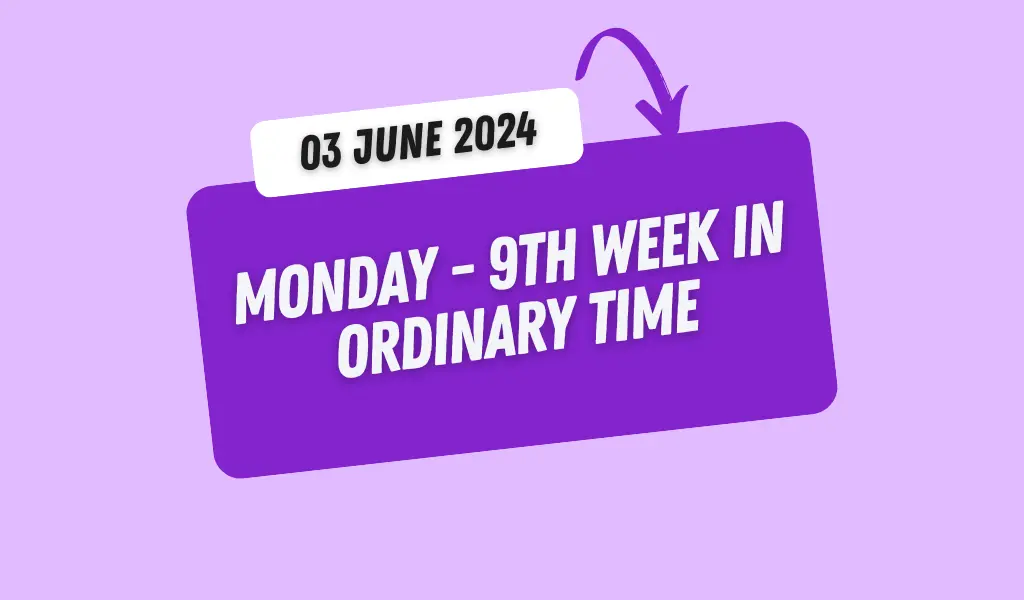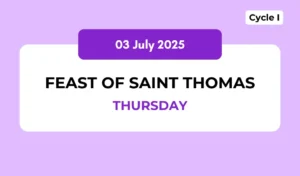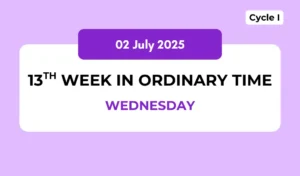Ninth Week of Ordinary Time
03rd June 2024 (Monday)
Psalter: Week 1
Reading of the Day
First Reading: 2 Peter 1:2-7
Beloved: May grace and peace be multiplied to you in the knowledge of God and of Jesus our Lord. His divine power has granted to us all things that pertain to life and godliness, through the knowledge of him who called us to his own glory and excellence, by which he has granted to us his precious and very great promises, so that through them you may become partakers of the divine nature, having escaped from the corruption that is in the world because of sinful desire. For this very reason, make every effort to supplement your faith with virtue, and virtue with knowledge, and knowledge with self-control, and self-control with steadfastness, and steadfastness with godliness, and godliness with brotherly affection, and brotherly affection with love.
Psalm 91:1-2, 14-15ab, 15c-16 (R. see 2b)
R/. O my God, I trust in you
Gospel Acclamation
V/. Alleluia
R/. Alleluia
V/. Jesus Christ, you are the faithful witness, the firstborn of the dead; you have loved us and freed us from our sins by your blood.
R/. Alleluia.
Gospel : Mark 12:1-12
At that time: Jesus began to speak to the chief priests and the scribes and the elders in parables. “A man planted a vineyard and put a fence around it and dug a pit for the winepress and built a tower, and leased it to tenants and went into another country. When the season came, he sent a servant to the tenants to get from them some of the fruit of the vineyard. And they took him and beat him and sent him away empty-handed. Again he sent to them another servant, and they struck him on the head and treated him shamefully. And he sent another, and him they killed. And so with many others: some they beat, and some they killed. He had still one other, a beloved son. Finally he sent him to them, saying, ‘They will respect my son.’ But those tenants said to one another, ‘This is the heir. Come, let us kill him, and the inheritance will be ours.’ And they took him and killed him and threw him out of the vineyard. What will the owner of the vineyard do? He will come and destroy the tenants and give the vineyard to others. Have you not read this Scripture: “‘The stone that the builders rejected has become the cornerstone; this was the Lord’s doing, and it is marvellous in our eyes’?” And they were seeking to arrest him but feared the people, for they perceived that he had told the parable against them. So they left him and went away.
Daily Gospel Reflection
Monday – Ninth Week of Ordinary Time
Guidelines: God is infinitely generous and He selflessly shares with us His love and graces. But sadly men become increasingly greedy and harm each other
1. There is a limit to need but never to greed. When need turns into greed, dissatisfaction begins and finally ends up in frustration. This leads to harm and destruction
2. We find a clear contrast between God’s mindset and that of humans. Jesus represents God’s mindset of generosity and the Jewish chief priests, scribes and elders represent the mindset of avarice. God always thinks about what and how to give to others abundantly. But selfish humans greedily desire to grab, misappropriate and hoard what is others’.
3. The vineyard in the gospel stands for our life on earth. With faith and diligence, God wants us to cultivate this field and produce a rich harvest. The fruits of good life and actions are what God expects from us.
4. But many get so much attached to earthly riches. They do not want to part with them. They want to be owners of their life with unbridled freedom. They do not realize our essential role and identity as “stewards” of the gift of vocation and mission given to us.
5. Hence they resent and resist any admonition and accountability. Their stewardship becomes tepid and then wicked. Therefore naturally God will decide to take away the stewardship. The eventual consequence will be severity and judgment.
6. In the light of the first reading, we have another contrast to these negative characters. It stands for a righteous and charitable follower of God. He remains faithful to God. He lives a righteous life abounding in works of charity.
Practice: Where do we stand? Are we like Tobit who is faithful and charitable? Or are we like the Jewish authorities who squander God’s riches?







